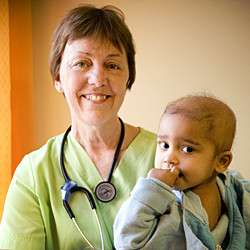Spotlight on: The Hematology/Oncology Department

Tuesday, April 3, 2007 - 14:31
Photo: Martine Granger, one of our oncology nurses and Fiona, 2 years old.
Mission
The Hematology-Oncology clinic goal is to improve the health and welfare of children with hematologic/oncologic disorders through excellent and compassionate clinical care, research and education.
Services
- Diagnostic and comprehensive family-centered care to children with cancer through an interdisciplinary team approach.
- Diagnostic and comprehensive treatment for children with sickle cell disease, thalassemia, thrombocytopenias, anemias, hemophilia, other bleeding disorders and immunodeficiency states.
- Hematopoietic stem cell transplantations are performed for malignancies, inborn errors such as immunodeficiency states and rare metabolic disorders.
- Clinical hematology laboratory, transfusion and molecular services.
Programs
- The childhood cancer care program: A team of highly skilled professionals composed of physicians, nurses, clinical social workers, child life specialists, psychiatrists, psychologists, clinical pharmacists, nutritionists, pastoral care, school teachers, as well as a massage therapist, an art therapist, and a music therapist help coordinate a comprehensive care plan for each child. The Hematology-Oncology Team also works in collaboration with the Palliative Care Service, the Intensive Ambulatory Care Service, and a variety of other health care disciplines. We are founding members of the Children’s Oncology Group and enroll patients into clinical trials.
- Benign Hematology Program: The team consists of hematologists, a nurse, and a social worker who evaluate and establish a personalized care plan.
- The Quebec Retinoblastoma Program is a unique joint provincial program in partnership with ophthalmologists from Hôpital Ste-Justine, consisting of a multidisciplinary team who evaluate, treat and follow those children in the province with cancer of the eye. The team also provides consultation to physicians within and outside the province concerning this rare eye tumor.
- A Neurosurgery-Oncology Clinic provides continuity of care and follow-up for patients with brain tumors. The team consists of neurosurgeons, a hematologist-oncologist, and a radiation-oncologist.
- A Musculo-Skeletal Clinic provides continuity of care and follow-up for patients with bone tumors, led by an orthopedic surgeon and a hematologist-oncologist.
- A long-term follow-up clinic for children under 18 years old was created to provide support and assessment of the long-term effects of chemotherapy and radiation. On reaching adulthood patients are transferred to a long-term follow-up clinic located at the Montreal General Hospital site within the MUHC. This team is composed of a pediatric hematologist-oncologist, a pediatric oncology nurse, an adult radiation-oncologist, along with an adult radiation-oncology nurse.
- A Transition Program offers continuity of care for patients over 18 years of age, in partnership with our sister hospitals within the MUHC.
- The AYA Clinic (adolescents and young adults) is designed for those patients continuing treatment and is based at the Royal Victoria Hospital site within the MUHC.
Medical breakthroughs and facts
- The majority of our patients are from Montreal (63%). The rest are from Montérégie (25%), Laval (5%) and remote regions (7%), and represent a variety of multicultural and linguistic groups.
- Annually, the Day Treatment Centre has 6,000 visits
- The Division of Hematology was established at the Children’s Memorial Hospital (later named the Montreal Children’s Hospital) in 1947 after the Second World War.
- We are a founding member and active participant of the Children’s Oncology Group, the world’s largest childhood cancer research organization.
- The Tumor Board Registry was started in 1949.
- The Hematology/Oncology Clinic was established in 1976. In 1998 the Day Treatment Center was re-located to a new setting.
- Long-term follow-up clinic for children over 18 yrs old was created in 1980 and for children in 2001.
- In 2006 the in-patient 8D unit was completely renovated.


